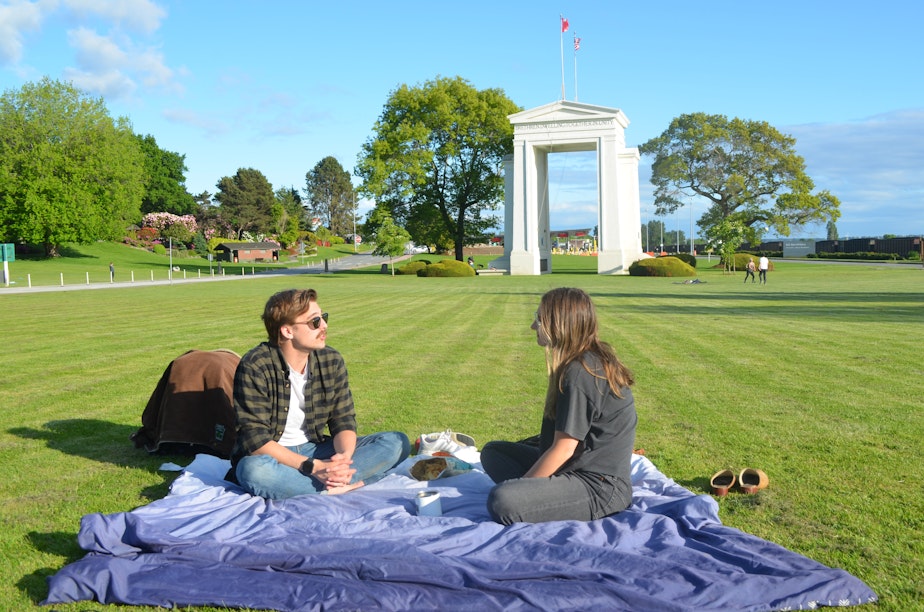She's Canadian. He's American. The border closed right before they were supposed to get married

On a chilly May evening after work, 26-year-old Ryan Hamilton and 25-year-old Savannah Koop met at the Peace Arch Park. That’s a park in Blaine, Washington, where pedestrians from the U.S. side can meet pedestrians from the Canadian side without officially crossing the border.
Hamilton lives in Bellingham, Washington, and Koop lives just across the border in Abbotsford, British Columbia. They met last July on a dating app and traveled easily between each other's homes across the international border.
And then, on March 21, the border closed to non-essential travel, and it’s going to stay closed till at least June 21. Visiting loved ones is not considered essential.
Sitting on the grass at the Peace Arch, the couple reflected on the whirlwind romance.
Koop was two hours late for their first date.
“I blamed it on the border line,” Koop said. “That was my excuse quite often, because I’m usually — I’m not punctual.”
Sponsored
“I was two hours late, but I probably only waited one hour at the border line-up,” Koop admitted.
By fall, they were talking about marriage.
“I used to say, ‘In eight to nine years, when we get engaged eventually,’” Hamilton said, “and then she said, ‘That’s not a funny joke anymore.’”
When they started looking at rings, “I was like, ‘I don’t want glitz and glam and a big diamond; I just want a simple gold band,’” Koop said.
“I was vocally one of those guys who was like, ‘I will never propose with just a simple gold band,’” Hamilton said.
Sponsored
But, then, when they decided to get engaged, their timeline was short: “There was a week and a half for me to get a ring, so it was either propose with no ring or propose with a simple gold band,” Hamilton said.
He went with a gold band.
Initially, they planned to marry in September, but then they moved the date up to May 8, when Koop’s parents would be visiting Canada from their home in Spain.
But, just after Hamilton and Koop got engaged, the coronavirus pandemic started to take off in North America.
“We had had an inkling that the borders were going to close, and I was checking the news every single hour,” Koop said.
Sponsored
The news came on March 20: The border was closing, effective the very next day.
“I think I bawled,” Koop said. Then, “We had this like one-day panic: Should Ryan come up? Should I go down?”
They were thinking about trying to cross the border before it closed, to get married that weekend.
“There was so much pressure that day to make a decision,” Koop said.
“That was tough: to feel like we had one last lifeline,” Hamilton said.
Sponsored
“And then the day was over,” Koop said. “That was incredibly heartbreaking.”
The next few weeks were “the toughest time on our relationship,” Koop remembered. “We were arguing constantly, because, I mean, the emotions were so high: Are we about to be separated for two weeks, a month, a year? We have no idea. What will that affect? What about our wedding?”
Then, the Canada and U.S. governments came to an agreement to keep the border closed at least through late May. Hamilton and Koop would have to postpone their wedding.
“That was one of the points where I thought, ‘This is a load of garbage,’” Hamilton said. “It doesn't make sense to me to not have an exemption for families and things like that.”
“And I had this thought: ‘We could at least see each other across the border line, right?’” Koop said. “Maybe we should meet there. I’m so sick of FaceTime. Ryan’s phone’s always dying on me.”
Sponsored
So they went on Google Maps and dropped a pin and drove to opposite sides of the border ditch.
“I’m sitting in my car and I see Ryan’s car coming up, and I’m just like, ‘Whoa, there’s Ryan! I can see him!’” Koop remembers. “And we get out of our cars and where we met we actually don’t meet there ever anymore — it’s quite a wide ditch.”
“That’s why we don’t meet there,” Hamilton said.
“It’s too wide,” Koop agreed. “It’s way wider than six feet.”
“And I just cried so hard,” Koop said. “It was just like streams of tears coming down my face. We went for a walk that day, and we sat down with the border line between us.”
“That was nice,” Hamilton said.
“It was so special,” Koop agreed. “And then we started to make it a habit. We found a better spot.”
“The next week, we went almost every day,” Hamilton said.
“Eventually we’d see more and more families and couples doing the same thing,” Koop said. “Mother’s Day weekend, for example, it was just littered with people.”
Then, on May 14, the Peace Arch Park reopened. Now, Hamilton and Koop can meet after work, share food, and hold hands.
“We haven’t been indoors together in almost three months,” Koop said. “It is, like, surreal to be like, ‘Oh, Ryan’s supposed to be my husband right now, but he's not.’”
“There’s been really hard days,” Hamilton said, “where you just wake up and you go, ‘Okay, I was supposed to have this other person next to me right now and instead I live with three amazing dudes, but—”
“Dudes nonetheless,” Koop interjected.
“I’d rather live with her,” Hamilton agreed.
“And it’s weird not to be able to even start our life together,” Hamilton said. “We’re just stuck.”
“We’ve realized that, through all of this, it has less to do with us having hope that things work out and everything to do with having faith that God has a plan,” Hamilton added. “It doesn’t actually matter if we get married on May 8, or May 29, or June 50.”

